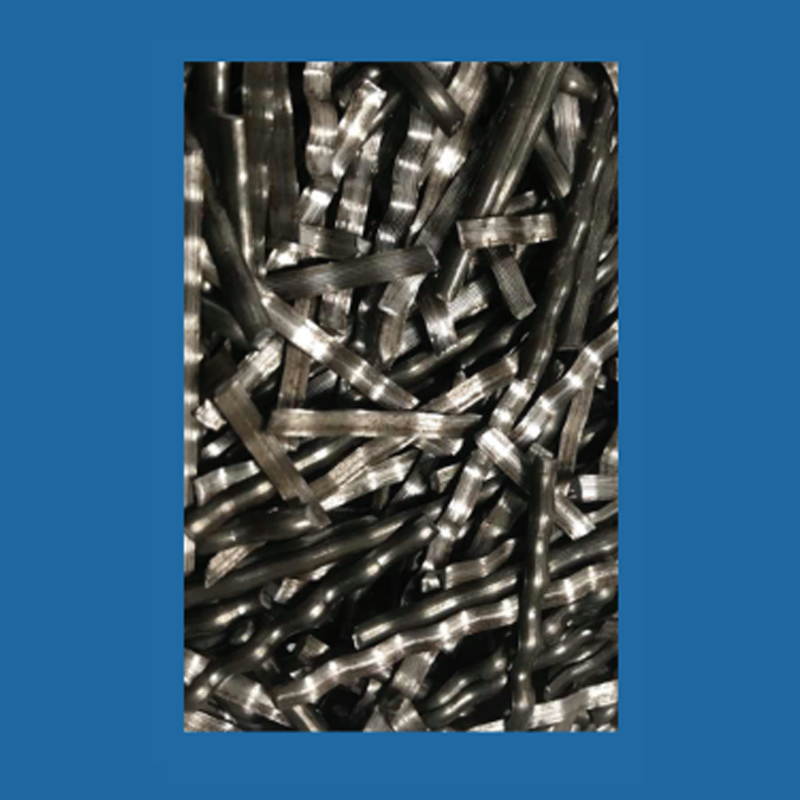
STEEL FIBER 03
Steel fibers are small, discontinuous, and short-length pieces of steel that are added to concrete to enhance its mechanical properties. The use of steel fibers in concrete is a common practice to improve the performance of the material in various applications. These fibers are typically made from carbon or stainless steel and come in various shapes, such as hooked, crimped, or straight.
INQUIRE / GET QUOTE
PRODUCT INFORMATION
Increased Flexural and Tensile Strength: Steel fibers improve the flexural and tensile strength of concrete, making it more resistant to cracking and providing enhanced durability.
Crack Control: The use of steel fibers helps control and minimize the width and propagation of cracks in concrete. This is particularly important in applications where cracking can compromise the structural integrity of the material.
Impact Resistance: Steel fiber-reinforced concrete exhibits improved impact resistance, making it suitable for applications where resistance to dynamic loads is essential, such as industrial floors and pavements.
Fatigue Resistance: The addition of steel fibers enhances the fatigue resistance of concrete, allowing it to withstand repeated loading and unloading cycles without significant deterioration.
Ductility: Steel fibers contribute to the ductility of concrete, which is crucial in seismic design and other situations where the structure needs to deform without catastrophic failure.
Reduced Shrinkage Cracking: Steel fibers can help reduce the potential for shrinkage cracking in concrete, especially in applications where drying shrinkage is a concern.
Enhanced Toughness: The toughness of concrete is improved with the addition of steel fibers, making it more capable of absorbing energy before failure.
Dosage: The dosage of steel fibers in concrete refers to the amount or concentration of steel fibers added to the concrete mix. The appropriate dosage depends on the specific requirements of the project, including the type of application, the desired performance characteristics, and any relevant industry standards or specifications. Dosage is typically measured by weight or volume percentages relative to the total volume of the concrete mix.Common dosages of steel fibers in concrete are in the range of 0.5% to 2.0% by volume or weight. However, the optimal dosage can vary based on factors such as the type of steel fibers used, the specific application, and the design requirements.
Here are some general guidelines:
Low Dosage (0.5% to 1.0%): This range is often used for applications where improved toughness and crack control are desired but where high flexural or tensile strength is not a primary concern. Examples include residential slabs, residential pavements, and non-structural applications.
Medium Dosage (1.0% to 1.5%): This range is common for applications where a balance of strength, toughness, and durability is required. It is often used in industrial floors, bridge decks, and other structural elements.
High Dosage (1.5% to 2.0% or more): This range is used in applications where high flexural or tensile strength is critical, such as in tunnel linings, precast elements, and other heavy-duty structures subjected to significant loads.
-It’s important to note that the type of steel fibers (shape, aspect ratio, and material) can also influence the optimal dosage.Additionally, project specifications or industry standards may provide specific recommendations for steel fiber dosage in different applications.
-It is advisable to consult with a structural engineer or a concrete mix design professional to determine the appropriate dosage of steel fibers based on the project requirements and local building codes. The mix design process involves considering various factors to ensure that the concrete meets the specific performance criteria for the intended application.
MORE INFORMATION
TECHNICAL INDICATORS
| Length | 45 – 50 mm |
| Equivalent Diameter | 0.7 – 0.8 mm |
| Tensile Strength | >600 MPa |
-Milled from thick steel plates or steel ingots. The overall surface is wavy and the cross-section is crescent-shaped.
-Mixing steel fibers into concrete involves adding the fibers to the concrete mix during the batching process.
Here are general steps to follow when mixing steel fibers into concrete:
Adding Steel Fibers: Introduce the steel fibers into the concrete mix. The fibers can be added to the concrete mixer along
with the other ingredients. Ensure that the fibers are distributed evenly throughout the mix.
Mixing: Mix the concrete thoroughly to ensure uniform distribution of the steel fibers. The mixing time may need to be
adjusted based on the type of mixer used and the specific requirements of the mix design. Monitor the consistency, workability,
and uniformity of the mix. Adjust the water content if necessary to achieve the desired workability while maintaining the
specified fiber dosage.
Transport and Placement: Transport the mixed concrete to the construction site promptly. During placement, take care to
avoid segregation of the steel fibers. Use proper construction techniques to ensure that the concrete is placed and compacted
effectively.
-It’s important to note that the specific details of mixing steel fibers into concrete can vary based on the type of
fibers used, the concrete mix design, and the equipment available. Always follow the guidelines provided by the fiber
manufacturer and consult with a concrete mix design professional or structural engineer to ensure that the mix meets the
project’s requirements and local building codes.
SEE WHAT OUR SATISFIED CUSTOMERS SAYS

WE ARE LOCATED AT
SIGN UP FOR OUR NEWSLETTER TO GET WEEKLY UPDATES ON EXCLUSIVE OFFERS AND DISCOUNTS!

+63 917 579 0055
ABOUT
SERVICES
PRODUCTS
TEAM
CONTACT US
BLOG/NEWS
FAQ
TEAM
INQUIRY
909 HIGH STREET SOUTH CORPORATE PLAZA TOWER 1, BGC TAGUIG PHILIPPINES
